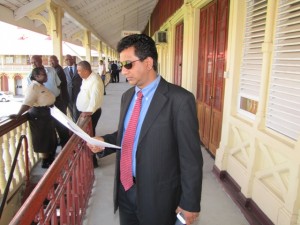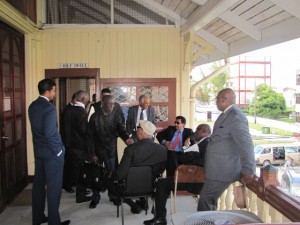– Court orders restoration of ERC funds, but rejects application for other agencies
By Ariana Gordon

Acting Chief Justice Ian Chang on Wednesday ruled that Finance Minister Dr Ashni Singh be allowed to withdraw monies from the Consolidated Fund as it becomes necessary for the functioning of the Ethic Relations Commission (ERC) Secretariat, but rejected the ex parte application filed by the Attorney General and Legal Affairs Minister Anil Nandlall that sought the restoration of the Gy$21.9 billion budget cuts.
Chang also ruled that the National Assembly can only approve and disapprove of the budget estimates, but not cut it. However, since the National Assembly has already approved the reduced estimates and President Donald Ramotar signed it into law, the court could not reverse that decision.
“The court sees it fit to order the minister of finance to allow payment from the Consolidated Fund, such sums as may be necessary from time to time for that entity to establish and maintain a secretariat as mandated by article 212 B (Five) and to perform its constitutional duties as prescribed by article 212D until the determination of this action, or until such time as the National Assembly do fix a lump sum by way of subvention,” Chang’s ruling stated in relation to the ERC.
The 2012 budget cuts were as a result of the combined opposition feeling that enough explanation was not provided to them by the administration. Some entities, including the ERC’s budget were chopped to Gy$1. The in-chamber decision followed a difference of opinion on what really was decided by the chief justice.
Attorneys representing the first and second named plaintiffs Raphael Trotman, in his capacity as Speaker of the National Assembly and David Granger, Leader of the Opposition have argued that the finance minister must return to the National Assembly to obtain the requisite finances for the functioning of the ERC.
Nigel Hughes representing Trotman told the media that following the chief justice’s ruling that the finance minister was not “granted any of the principle reliefs claimed for in the ex parte application… he (the chief justice), however, said because the ERC is a constitutional body and their expenses are charged on the Consolidated Fund, he was going to allow the ERC to operate on the basis on such expenses that they incur, and as are needed from time to time”.
Hughes added that the chief justice refused all other applications so that the minister of finance “is not permitted to go to the Consolidated Fund or any other fund” to reverse the budget cuts.
He added that the chief justice’s ruling was made though the respondents were not given an opportunity to put “their facts before the court”. Despite objection to that process, the chief justice ruled. “This is an opposed ex parte which means the respondents have not been heard, the chief justice expressed some opinions which we do not agree with, but of course those opinions are premature, and he has not had an opportunity to hear from us on them.”
Hughes continued: “This is a very curious proceeding – because we have not been able to put our arguments in, he has now given us leave to file an affidavit in answer – he has given us 21 days and the AG 14 days after and we come back here on the 6th September. As the position now stands, the ERC’s essential expenses are charged to the Consolidated Fund.”
He could not say with certainty whether the finance minister would have to go back to Parliament to get approval, but noted that the parties to the case will be engaging the chief justice to obtain clarity on the issue.
Additionally, Roysdale Forde, also representing the first named defendant, said “the court made no order, ordering the National Assembly to make any funds available in relation to any cuts. The court found in relation to the ERC, it being a constitutional body, its sums should be charged on the Consolidated Fund and the minister may make such charge as he deems necessary.”
He continued: “No order sought by the AG as prayed for has been granted.” Similarly, Senior Counsel Rex McKay in simplifying the chief justice’s order said the AG asked the court to permit the finance minister to access the Contingencies Fund, a claim that was subsequently amended to read the Consolidated Fund that amounted to some Gy$21 billion. “The long and short of it is the court has only said that the minister may from time to time access the amount for the ERC which totalled Gy$99 million… that is the position, everything else is obiter dicta, meaning not a decision in itself… that is the long and short of the proceedings.”





Comments are closed.